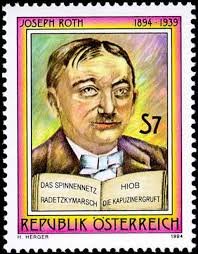In 1923 at the age of 29, Joseph Roth was hired by the Frankfurter Zeitung, the oldest and most widely read liberal daily newspaper in Germany. He soon became the paper’s Paris correspondent, dispatched from there to cover the south of France, Russia, the Balkans, Italy, and Poland. Although today he is best known for The Radetsky March, his most accomplished novel, during his lifetime his reputation rested on his hundreds of feuilletons, brief journalistic articles that functioned in general as the most popular forms of cultural commentary in the Weimar Republic.
 Thomas Mann, Walter Benjamin, Herman Hesse and Alfred Döblin also were feuilletonists, but Roth was the master of the form. The feuilleton usually appeared below the fold, sometimes on the front page. Unlike an op-ed piece, it blended topical news, description, opinion, travelogue, curious encounters, personal sketches, and lyricism. Howard Eiland, Benjamin’s biographer, says that the feuilleton “had become so pervasive as to seem the cognate of metropolitan modernity.”
Thomas Mann, Walter Benjamin, Herman Hesse and Alfred Döblin also were feuilletonists, but Roth was the master of the form. The feuilleton usually appeared below the fold, sometimes on the front page. Unlike an op-ed piece, it blended topical news, description, opinion, travelogue, curious encounters, personal sketches, and lyricism. Howard Eiland, Benjamin’s biographer, says that the feuilleton “had become so pervasive as to seem the cognate of metropolitan modernity.”
“Other men may return to hearth and home, and wife and child,” Roth wrote in a piece called “Arrival in the Hotel” (1929). “I celebrate my return to lobby and chandelier, porter and chambermaid.” In his splendid translations, Michael Hofmann includes seven other hotel articles in The Hotel Years along with 55 other feuilletons in sections titled Germany, Sketches, Austria and Elsewhere, USSR, Albania, Pleasures and Pains, and Ending.
The contemplation of modernity in Vienna or Berlin in 1923 occurred among and was tinted by the straitened circumstances of a beaten and bankrupt middle Europe. As a Jew who grew up in Galicia and made his unlikely way to Vienna, Roth was a Hapsburg loyalist. He had served as an editor of an Austrian military newspaper during the Great War. But as a journalist, he devised a multivalent persona, alternately critical and empathic, anxious and humanistic, worried and amused. In his descriptions of things as they were, he foresaw what was approaching. In “Germany in Winter” (1923), he writes:
“In the West End of Berlin, I saw two high-school kids. They were walking along the wide, busy road, arm in arm, like a pair of drinks, and singing
Down, down with the Jewish republic,
filthy Yids,
filthy Yids!
And passers-by got out of their way. No one stopped to slap their faces. Not out of political indignation. But because in any other country the irritation of a kid bothering the street with his half-baked politics would have provoked someone to a pedagogic measure. In Germany the convictions of high-school boys are respected. That’s how law-abiding people are in Berlin. And that discipline is headed for a tragic ending … No one understands Germany. It is the least understood nation in Europe.”
 To label his columns “satires” is to scant the intellectual and tonal richness of his work. In “Rose Gentschow” (1924), he writes about a 33-year old woman, a morphine addict, who is driven to abet a criminal in thieving from men she meets in bars, spiking their drinks with opium. Then, one of her targets named Hempel dies from the drug, and she is arrested. This is journalism – but Roth’s language indicates a more intense level of interest that calls for lyrical terseness:
To label his columns “satires” is to scant the intellectual and tonal richness of his work. In “Rose Gentschow” (1924), he writes about a 33-year old woman, a morphine addict, who is driven to abet a criminal in thieving from men she meets in bars, spiking their drinks with opium. Then, one of her targets named Hempel dies from the drug, and she is arrested. This is journalism – but Roth’s language indicates a more intense level of interest that calls for lyrical terseness:
“Rose Gentschow has the beguiling expression of the incurable vice girl. It comes from the faraway sins of dreams. It goes into dreamy sins. She lives in consuming passion … On no fewer than fifteen occasions she has tried to escape her fate. Fifteen times she went on a detoxification cure. Fifteen times she lapsed back into morphine dependency. She would have extended her life and her method to an early grave had Hempel had a stronger constitution. That he didn’t was blind chance. A stroke of fortune interrupted the activity of the lady poisoner. That’s how she’s referred to in the court reports. The one who is poisoned though is she. Her hands are thin, and her gestures awkward and embarrassed. She cries a lot. She tries to hide her face. Then she dries her eyes with a fist. The childish movement is charming. Little girls dry their tears with their fists.”
He also takes great delight in his subjects. In “The Cook in his Kitchen” (1929), he lavishes affectionate attention on a chef:
“Here is the creator of the roast chickens that go flying into your mouth. His white brimless top hat of striped canvas, equally reminiscent of a turban, night-cap, and the underlining of a royal crown, deepens the natural russet of his cheeks, the lustrous metallic black of his dense, bushy eyebrows, and the golden brown of his small, darting eyes, that playfully move over his cheeks, supervise the sous-chefs, watch the cauldrons, pursue the movements of the long spoons. In its crooked exuberance that hat grazes his red, throbbing, right ear, which seems to manifest an optimism all of its own. His red lips are set in an unvarying smile. The broad soft chin is bedded on a comfortable jowl. The broad nostrils sniff the smells of the dishes and the nuances of the smells. And under the white apron curves his capacious and benevolent belly, where a second and particular heart would find room. That’s what I call a cook!”
 But it is the ominous, mordant observation that points to Roth’s own tragedy. On the very day Hitler became Reich Chancellor, January 30, 1933, Roth left Berlin by train for Paris, never to return. The Radetsky March, his tenth novel, was published just before his exile began. In a 1928 column written in Rome, he said, “A change in regime is something a traveler sees first in a hotel porter. His first move after welcoming the guest is to ask for his passport … When I go to him for stamps, he takes the trouble to read the names of my addressees. So concerned is he for my comfort that he will not let me walk a few steps to the letter box. He insists on posting my letters himself. The outcome is that they arrive a day or two later than they should have done.”
But it is the ominous, mordant observation that points to Roth’s own tragedy. On the very day Hitler became Reich Chancellor, January 30, 1933, Roth left Berlin by train for Paris, never to return. The Radetsky March, his tenth novel, was published just before his exile began. In a 1928 column written in Rome, he said, “A change in regime is something a traveler sees first in a hotel porter. His first move after welcoming the guest is to ask for his passport … When I go to him for stamps, he takes the trouble to read the names of my addressees. So concerned is he for my comfort that he will not let me walk a few steps to the letter box. He insists on posting my letters himself. The outcome is that they arrive a day or two later than they should have done.”
Through the remainder of the 1930s, Roth struggled to find work, appealed to Stefan Zweig for assistance, and lost his German publisher and royalties — and yet, he continued to write fiction at the rate of a novel a year, selling them to publishers in Holland and Austria. His wife Friedericke suffered from schizophrenia; his alcoholism became chronic. In a 1935 letter, he wrote, “I am wriggling in a hundred nets.” He died on May 27, 1939 of pneumonia and delirium tremens. Fourteen months later, the Germans euthanized his wife.
Whether observing the lives of oil field workers in Galicia, or army recruits in Albania, or Czarist émigrés in Paris, or desk workers at his publisher’s office, Roth told Europe that the looming truths may be found in the ordinary scene. He saw that the new nation-states created after the Great War pointed to the “modern” – but that the repercussions of such radical redrawings of boundaries were inciting ethnic hatred. Michael Hofmann once described Roth’s final, desperate letters as “the protocol of a man going over the edge of the world in a barrel.” Europe went with him.
[Published by New Directions on September 8, 2015. 288 pages, $16.95 paperback]